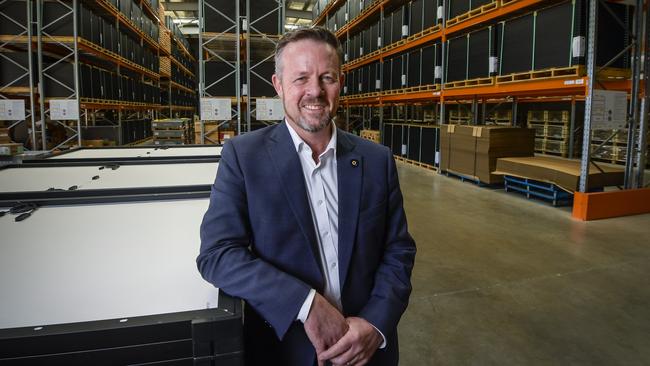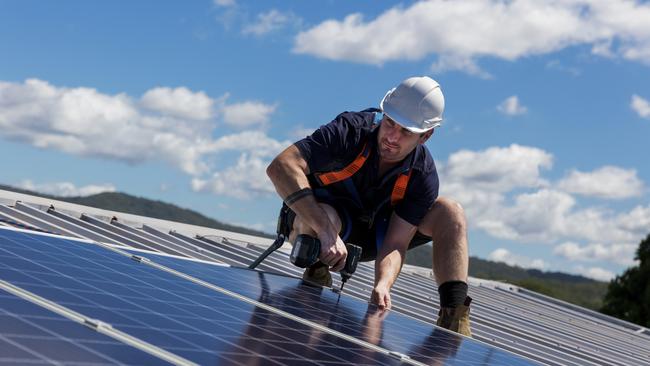‘Smoking $100 notes’: Why doing nothing better than subsidies
Many economists don’t want the government to pour billions of dollars into propping up local manufacturing, with one likening some subsidies to ‘asking taxpayers to smoke $100 notes’.

Doing nothing at all would arguably be better than pouring an as yet unknowable number of billions of taxpayer dollars into subsidies to bolster Australian manufacturing, Deloitte partner Steve Smith says, while a prominent fellow economist says subsidising locally-made solar panels is “asking taxpayers to smoke $100 notes’’.
The federal government in mid-April launched its Future Made in Australia policy, declaring that “the game has changed” and that generous government subsidies for industry, such as those rolled out under the hugely generous Inflation Reduction Act in the US, were “the new competition’’.
Economists, including the head of the government’s own Productivity Commission, Danielle Wood, have failed to be won over, with a chorus of dissent from the nation’s leading economic thinkers around the policy, which is yet to be fleshed out.
Currently Future Made in Australia is little more than an umbrella term which sits over already-announced programs such as Hydrogen Headstart, and the $1bn Solar Sunshot program announced in March, which aims to develop a locally-based solar panel manufacturing industry.
Deloitte’s pre-Budget assessment of the policy said Prime Minister Anthony Albanese’s speech launching it in April “shocked many”, and “the reaction from the country’s economists has been swift and loud’’.
“The Future Made in Australia policy is unlikely to stack up when considered using orthodox economic models because it will impose economic costs that outweigh the economic benefits,’’ Deloitte says.
“A proper debate on the Future Made in Australia policy must focus on the costs and benefits of both doing nothing – if the world has changed – alongside the costs and benefits to taxpayers and consumers from interventions.’’
Speaking to The Australian on Monday, Mr Smith said Australia could not compete with other major economies when it came to subsidising industries, and it was hard to understand why it would try to.
“I think there’s a couple of challenges here,’’ Mr Smith said.
“One is that other very large economies are doing similar things and so there’s probably a temptation to use that as a reason to provide subsidies or increase tariffs.
“But the fact is we can’t really compete with the United States on something like the Inflation Reduction Act.

“Yes, it’s possible that doing nothing is better. I think the real issue is nobody really knows, and it’s not quite clear exactly what this policy is seeking to insure against.’’
Mr Smith said, in the case of the nation looking to build a sovereign capability in solar panel manufacture, “it would be very difficult to argue for that policy on economic grounds’’.
“It would be very difficult to find an economist to support that policy, and over the last 30 years or so, we have been broadly undoing policies of that of that kind.
“And so in order for a policy like that to stack up, you must be of the view that we won’t be able to obtain solar panels from overseas - from a country like China which dominates the world market at the moment - for whatever reason.’’
Mr Smith said it would also be very difficult to make an industry like solar panel manufacturing work without punitive tariffs on imports.
Independent economic Chris Richardson, speaking on a podcast interview with The Conversation recently, said he was “not a fan” of the Future Made in Australia policy.
Mr Richardson said he was open to the argument of subsidising sectors where Australia would emerge with a genuine advantage over time, “but you look at something like solar panels and throwing money at that is just spectacularly dumb, it’s just a waste of money, it’s the equivalent of asking taxpayers to smoke $100 notes’’.
“I do worry that bits of the new industry policy are a little bit more around having announcements in some key marginal seats in Queensland,’’ Mr Richardson said.
The Productivity Commissioner Ms Wood said in April that subsidies for the low-emissions manufacturing sector would “take jobs and capital investments from elsewhere in the economy where they could generate higher value”.
“In a period of tight labour markets, and many areas of growing future demand for labour, this compounds the costs of industry support,” Ms Wood said at the time.
Ms Wood said it was important for the government to have an “exit strategy” from support programs and to be mindful of the sunk costs, year after year, for industries that could not were not self-sustaining.
“For industries that are not able to ‘stand on their own two feet’ in competing globally, more money will be needed for every year we choose to ‘rent’ the industry,” Ms Wood said. “Second, we will see a whole class of businesses whose livelihoods depend on ongoing support, which will have an incentive to spend a lot of time and resources ensuring that the tap is not turned off. To make sure that new supports make sense, we would encourage the government to be very clear in specifying their policy objectives.
“Understanding whether we are trying to reduce supply-chain risks, speed up the green transition or create jobs is needed to help evaluate whether the policies stack up.”
Mr Smith said rather than provide subsidies or the government picking winners, he would prefer to see the tax system used to incentivise investment, for example through accelerated depreciation for companies investing in certain sectors.



